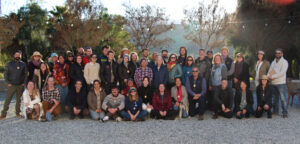When you want to make change, it can be hard to know where to begin. In the complex world of increasing organic and local procurement for school meals, being able to draw upon inspiration and guidance from leaders, peers, and experts is critical. With this in mind, Conscious Kitchen organized the Central Coast Organic School Food Summit at Paicines Ranch — to bring like-minded people together and forge important connections that further our collective work.
 The idea for this convening came from a conversation with Food Service Director Jeanie Aiken at the California School Nutrition Association in October and is motivated by our daily work across the West Contra Costa Unified School District with Food Service Director Barbara Jellison. We chose to host it in the Central Coast, referred to as the “salad bowl” of our state, a region which is home to more than 100 organic farmers with diverse backgrounds, skill sets, ages and tremendous commitment to the land. We sought to create space for stakeholders to explore ideas and cultivate school food ecosystems rooted in local, organic procurement — connecting buyers (schools) and sellers (organic farmers) to better nourish California kids and steward natural resources.
The idea for this convening came from a conversation with Food Service Director Jeanie Aiken at the California School Nutrition Association in October and is motivated by our daily work across the West Contra Costa Unified School District with Food Service Director Barbara Jellison. We chose to host it in the Central Coast, referred to as the “salad bowl” of our state, a region which is home to more than 100 organic farmers with diverse backgrounds, skill sets, ages and tremendous commitment to the land. We sought to create space for stakeholders to explore ideas and cultivate school food ecosystems rooted in local, organic procurement — connecting buyers (schools) and sellers (organic farmers) to better nourish California kids and steward natural resources.
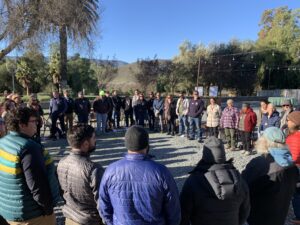 For two days, we hosted over fifty esteemed guests who represent various food system sectors – farmers, ranchers, food service directors, farm to table chefs, culinary directors, processors, aggregators, distributors, community stakeholders. county, state, and federal agencies, including the United States Department of Agriculture (USDA) and California Department of Food and Agriculture (CDFA). Paicines Ranch is a 7,000 acre organic regenerative working farm in San Benito County and provided the perfect backdrop for our gathering, as we saw their mission in action: to work with the dynamic natural world at the ranch to regenerate the health of the ecosystem from the soil up while growing delicious, nourishing food for our community.
For two days, we hosted over fifty esteemed guests who represent various food system sectors – farmers, ranchers, food service directors, farm to table chefs, culinary directors, processors, aggregators, distributors, community stakeholders. county, state, and federal agencies, including the United States Department of Agriculture (USDA) and California Department of Food and Agriculture (CDFA). Paicines Ranch is a 7,000 acre organic regenerative working farm in San Benito County and provided the perfect backdrop for our gathering, as we saw their mission in action: to work with the dynamic natural world at the ranch to regenerate the health of the ecosystem from the soil up while growing delicious, nourishing food for our community.
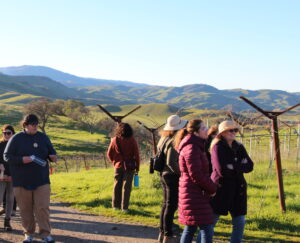 After guests arrived, Sallie Calhoun, Owner of Paicines Ranch, and Elaine Patarini, Director of the Paicines Ranch Learning Center, took us on a breathtaking tour of the ranch’s prairie lands and vineyard. We began at the vermicompost bin, where worms process food scraps from the kitchen. The invertebrates are considered “livestock,” as they feed and fertilize the ranch’s 550 acres of row crops. We looked out over 2,000 sheep grazing on expansive rolling hills of green, learning how the ranch uses holistic plant grazing methods – a practice that considers the time plants are exposed to grazing and plans for recovery. In a world where animal agriculture causes much damage, it is inspiring to see ranch operations with a deep commitment to steward the land.
After guests arrived, Sallie Calhoun, Owner of Paicines Ranch, and Elaine Patarini, Director of the Paicines Ranch Learning Center, took us on a breathtaking tour of the ranch’s prairie lands and vineyard. We began at the vermicompost bin, where worms process food scraps from the kitchen. The invertebrates are considered “livestock,” as they feed and fertilize the ranch’s 550 acres of row crops. We looked out over 2,000 sheep grazing on expansive rolling hills of green, learning how the ranch uses holistic plant grazing methods – a practice that considers the time plants are exposed to grazing and plans for recovery. In a world where animal agriculture causes much damage, it is inspiring to see ranch operations with a deep commitment to steward the land.
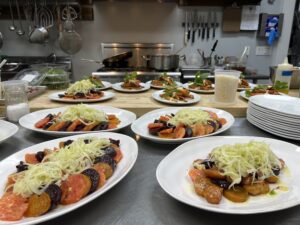 Paicines Ranch Executive Chef, Carlos Canada, thoughtfully curated a fully FLOSN — fresh local organic seasonal nutritious — and delicious meal, paired with RAEN Winery Pinot Noir and Chardonnay. The dinner menu included: Cara Cara orange, beet and fennel salad with lemon puree and extra virgin olive oil; carrot salad with pumpkin seeds and blistered radishes tossed with vadouvan cream; Paicines Ranch braised beef short ribs with horseradish cream, baby turnips and greens; and inter squash risotto with charred radicchio and aged balsamic.
Paicines Ranch Executive Chef, Carlos Canada, thoughtfully curated a fully FLOSN — fresh local organic seasonal nutritious — and delicious meal, paired with RAEN Winery Pinot Noir and Chardonnay. The dinner menu included: Cara Cara orange, beet and fennel salad with lemon puree and extra virgin olive oil; carrot salad with pumpkin seeds and blistered radishes tossed with vadouvan cream; Paicines Ranch braised beef short ribs with horseradish cream, baby turnips and greens; and inter squash risotto with charred radicchio and aged balsamic.
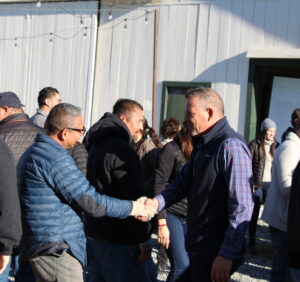 Our full-day gathering began with a circle of introductions, goal-setting and discussion before breaking into small groups for the first session, Storytelling, Opportunities, & Challenges. All were invited to share experiences and think together about how to best support systems change — from logistics and commitments required of farmers, food service directors, and vendors for planning, buying, and serving organic food to students. Through such connections, discussion of barriers, and development of relevant collaborative solutions, we chart a course toward viable expansion of organic school meal offerings to nourish young minds and bodies.
Our full-day gathering began with a circle of introductions, goal-setting and discussion before breaking into small groups for the first session, Storytelling, Opportunities, & Challenges. All were invited to share experiences and think together about how to best support systems change — from logistics and commitments required of farmers, food service directors, and vendors for planning, buying, and serving organic food to students. Through such connections, discussion of barriers, and development of relevant collaborative solutions, we chart a course toward viable expansion of organic school meal offerings to nourish young minds and bodies.
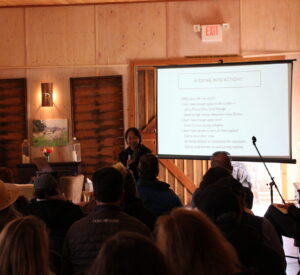 To introduce the second session, Farm to School: Mapping The Journey, Farmer Janet Nagamine of Hikari Farms in Watsonville told the compelling story of how she started selling organic apples to local schools and the village it took to ensure she could make it happen. Creative, out-of-the-box thinking, and a supportive community allowed her to achieve that goal and propel her journey. During the next discussion, attendees brainstormed multi stakeholder collaborations around mutually beneficial solutions. Everyone took great value away from these dialogues, including Janet.
To introduce the second session, Farm to School: Mapping The Journey, Farmer Janet Nagamine of Hikari Farms in Watsonville told the compelling story of how she started selling organic apples to local schools and the village it took to ensure she could make it happen. Creative, out-of-the-box thinking, and a supportive community allowed her to achieve that goal and propel her journey. During the next discussion, attendees brainstormed multi stakeholder collaborations around mutually beneficial solutions. Everyone took great value away from these dialogues, including Janet.
“The cross-talk and dialogue between interdisciplinary people from schools, farms, distributors, and especially USDA/CDFA was extremely informative, inspiring, and eye-opening for me, as a farmer. I learned about commodity dollars, cross-docking and farm coops — and it convinced me that continued talk amongst these groups will pave the way for infrastructures that support better outcomes in health, nutrition, and sustainability efforts!” These are the precise outcomes for which we aimed in organizing such a symposium.
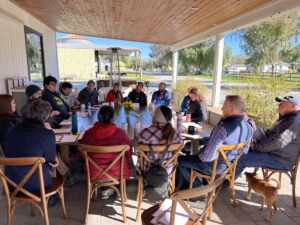 With our brains fueled by another delicious organic meal prepared by Paicines Ranch Chef Carlos, we gathered to hear Stories From the Field. Rachel Sullivan, Manager of Frog Hollow Farms in Brentwood, spoke from the perspective of a farmer about being approved for the USDA Fresh Fruits and Vegetable Pilot (FFVP) program in December. Barbara Jellison shared about the same program from a food service director point of view, speaking of purchasing strawberries from JSM Organics in Royal Oaks using commodity dollars through the FFVP. Michael Jochner from Morgan Hill Unified School District in Southern Santa Clara County recounted how his Freight Farm produces 1,000 heads of lettuce weekly, using only 5 gallons of water each day. “We’re committed to continuing the partnership with small farms and organic farms, and I’m especially grateful for the small farms that did show up today,” he said, reflecting on the importance of small farming operations. These rich stories were followed by a robust question and answer session with Julie Brewer, Director of Community Food Systems Division with the USDA Food and Nutrition Service.
With our brains fueled by another delicious organic meal prepared by Paicines Ranch Chef Carlos, we gathered to hear Stories From the Field. Rachel Sullivan, Manager of Frog Hollow Farms in Brentwood, spoke from the perspective of a farmer about being approved for the USDA Fresh Fruits and Vegetable Pilot (FFVP) program in December. Barbara Jellison shared about the same program from a food service director point of view, speaking of purchasing strawberries from JSM Organics in Royal Oaks using commodity dollars through the FFVP. Michael Jochner from Morgan Hill Unified School District in Southern Santa Clara County recounted how his Freight Farm produces 1,000 heads of lettuce weekly, using only 5 gallons of water each day. “We’re committed to continuing the partnership with small farms and organic farms, and I’m especially grateful for the small farms that did show up today,” he said, reflecting on the importance of small farming operations. These rich stories were followed by a robust question and answer session with Julie Brewer, Director of Community Food Systems Division with the USDA Food and Nutrition Service.
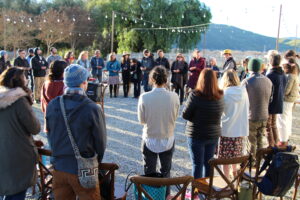 We closed Conscious Kitchen’s inaugural Central Coast Organic School Food Summit with an uplifting, mobilizing circle where everyone shared commitments to carry the momentum of the convening forward and the impact of the intentional gathering of mission-driven minds. Elevating farmers, honoring their hard work, contributions and knowledge, and promoting opportunities for more of us to learn and purchase directly from these experts is critical to thriving food systems. As Maria Reyes, Farmer and Owner of Narci Organics in San Juan Bautista said, “I was really motivated to come here today and learn from everyone and see everybody who’s interested in learning from small farmers. Specifically, those wanting to learn from my farm and everything I grow.”
We closed Conscious Kitchen’s inaugural Central Coast Organic School Food Summit with an uplifting, mobilizing circle where everyone shared commitments to carry the momentum of the convening forward and the impact of the intentional gathering of mission-driven minds. Elevating farmers, honoring their hard work, contributions and knowledge, and promoting opportunities for more of us to learn and purchase directly from these experts is critical to thriving food systems. As Maria Reyes, Farmer and Owner of Narci Organics in San Juan Bautista said, “I was really motivated to come here today and learn from everyone and see everybody who’s interested in learning from small farmers. Specifically, those wanting to learn from my farm and everything I grow.”
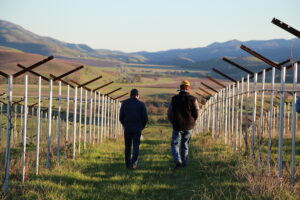 Our work centers farmers and school food services teams as key players in spurring, cultivating and sustaining lasting change — and attendees walked away with deep recognition of their value and vision. Yael Cypers, Director of Procurement, Alice Waters Institute, noted this. “I’m really inspired by the grit and perseverance of both farmers and Food Service Directors because they’re paving the way and creating a system that isn’t inherently supported yet, but creating a model that will create a movement across the country.” That is indeed the heart of the Conscious Kitchen model and growing movement with diverse stakeholders in the Central Coast, throughout California, and beyond — and we are proud to be building out efficient, effective, economical local organic food systems alongside brilliant partners. With the energy of convenings like this, individuals, organizations, businesses and schools like those who joined us, and places like Paicines Ranch, we are proud to continue to collaboratively drive paradigm shifts!
Our work centers farmers and school food services teams as key players in spurring, cultivating and sustaining lasting change — and attendees walked away with deep recognition of their value and vision. Yael Cypers, Director of Procurement, Alice Waters Institute, noted this. “I’m really inspired by the grit and perseverance of both farmers and Food Service Directors because they’re paving the way and creating a system that isn’t inherently supported yet, but creating a model that will create a movement across the country.” That is indeed the heart of the Conscious Kitchen model and growing movement with diverse stakeholders in the Central Coast, throughout California, and beyond — and we are proud to be building out efficient, effective, economical local organic food systems alongside brilliant partners. With the energy of convenings like this, individuals, organizations, businesses and schools like those who joined us, and places like Paicines Ranch, we are proud to continue to collaboratively drive paradigm shifts!
